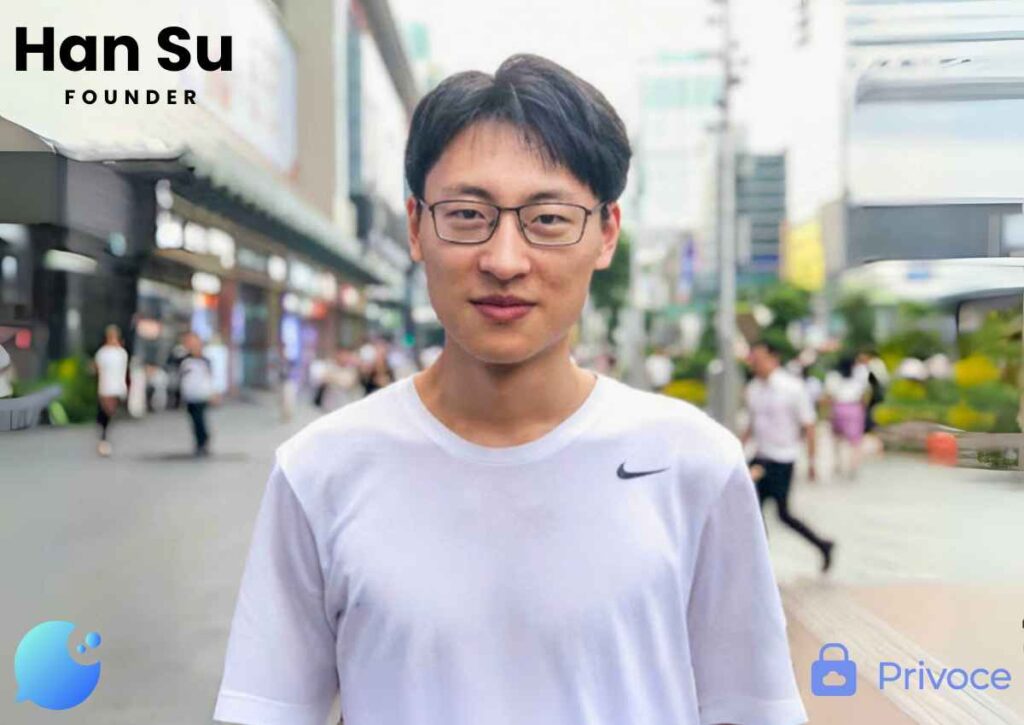
We recently had the privilege of interviewing Han Su, Founder of Privoce, a US startup composed of top talents around the world. With a deep interest in technologies dealing with information, data interoperability, community, and civic media, Han has built his company’s flagship product “VoceChat,” which is used by 150,000+ websites to add a chat feature on their website and has millions of users.
Privoce provides VoceChat and various Al features that run on the user’s cloud server, where they can choose their functions and the user will own their data. In this insightful session, Han shares about his business, his visions for this field, challenging phases, and priorities that shaped his current leadership approach.
The Beginning
We started the interview by asking, “Reflecting on your journey, what inspired you to start in your current industry, and what was a defining moment early in your career?”
Han shared, “Firstly, I’m happy to have this interview with Business Magazine UAE. I studied at NYU Abu Dhabi for one semester and liked the UAE. Before I started Privoce in the United States, I was interning at WeChat, a popular social media app by Tencent. At the same time, I was also working on my MIT thesis titled ‘Theory and Practice Towards a Decentralized Internet.’ During this period, I delved deeply into the history of social media and information platforms, from pre-web email lists to forums and personal websites in the World Wide Web era, then to centralized social media platforms like Twitter and Facebook, and finally to current mobile social media apps like WeChat and TikTok.
I realized that the shift from public forums and personal sites to centralized platforms was not driven by netizens’ choices but by the advertising business model. Therefore, I see an opportunity to offer a more user-oriented model that charges a one-time license fee, provides similar social media features, and runs based on personal websites as an extended feature—turning personal sites into a Facebook-like platform or a company site into a Slack-like platform.”
Transforming Challenges Into Opportunities
We further asked, “Throughout your career, what has been one of the most significant challenges you faced, and how did you overcome it?”
Speaking about the challenges, Han explained, “The most challenging aspects are the technical challenges, the tech stack, and the communication protocol. Since our solution runs on our users’ websites, individual users won’t have the super-servers that companies like Tencent and Meta have. Most of the time, the user’s server (the hardware that hosts the website) provides only basic computing power, so we must make our solution extremely efficient to accommodate users with home servers or companies using NAS (Network Attached Storage) servers. After several experiments and iterations, we developed VoceChat with Rust programming language, a pre-compiled language that consumes minimal resources and requires little maintenance.
After publishing the first version of VoceChat, we have received valuable feedback from our enthusiastic users. One common request is for an alternative to the FCM notification system, as it is not available in certain regions. Another frequent request is to support the Matrix protocol, a communication protocol used by 100 million users and numerous organizations including the United Nations. Since current Matrix servers are quite complex to host, VoceChat’s one-click easy hosting could fulfill this need. We are actively addressing these requests with our proven tech stack, tailored for personal site users and small businesses.”
Potential Trends Of The Future
We asked, “Given the rapid evolution in your industry, what major trends do you see shaping the future, and how is your company preparing for them?”
He shared, “Privately hosted LLMs (Large Language Models) are private versions of ChatGPT-level AI models, where all computing occurs on your server, giving you full control over your data. One of the biggest issues on today’s Internet is data lock-in and loss of data ownership—large platforms tend to monopolize their fields, such as Facebook in social media and ChatGPT in AI. This creates an opportunity for open-source solutions.
Many VoceChat users who pay for our software are companies needing private chat solutions to replace Slack or Teams. A local AI agent, tuned to your data, can be more personalized and powerful than centralized services. Just as PCs defined the 2000s and smartphones defined the 2010s, personal AI agents on personal cloud servers will be the defining technology of the 2020s.”
Plans We Asked Han Su
Eager to learn about the goals Han has set for his business, we asked, “Looking ahead, what are your aspirations for your company, and what strategies are you considering to achieve them?”
“As mentioned above, users have been requesting support for the Matrix protocol, so we have allocated significant resources to developing a Matrix server written in Rust. Additionally, we have been closely monitoring WebTransport and MoC (Media over QUIC) to provide a privately hosted, real-time video solution that is interoperable—similar to the popular voice-based social media app Clubhouse or the voice game community Discord, but with each room hosted on a personal website. This setup would allow people to jump from one room to another, thanks to the interoperability Matrix protocol, while everyone can host their private social media under their site.” Han responded.
Embracing Emerging Technology
AI and emerging technologies are transforming businesses. To learn how Han Su is preparing his business to adapt to the same, we asked, “How do you see these changes affecting your industry, and how is your company adapting?”
Emphasizing the rising usage of AI, he shared, “My focused field is self-hosted open-source software. In today’s Internet, the most popular open-source product is WordPress, a personal blogging solution used by half a billion websites. However, I don’t think most readers of this interview are familiar with WordPress, but I bet they’ve heard of Facebook.
While the ease of using Facebook once made hosting your WordPress site seem less appealing, that won’t be the case in the AI era. People—and especially companies—won’t want an AI outside their control learning every piece of data about them. An AI agent based on open-source models like Llama3 that runs locally will earn more trust and popularity compared to a centralized service like ChatGPT.”
Empowering Users Via ‘Deplatformization’
We further asked, “What guiding principles or core values have you consistently relied on to drive your company’s success?”
Han added, “Prioritize product value over profit. Do the hardest thing as long as it’s right. Most social media companies have been locked by their advertisement models. We are seeing the current social media platform turning to a TV-like experience mediated by recommendation algorithms in the form of short videos, where users are passive rather than participative. I see this as a deviation from genuine human connections and interactions. Our goal in building VoceChat is to provide a private space for information exchange and human interaction, without any macro-level control over the system.
‘Deplatformization’—empowering individuals by turning them into their platform—is the first step toward re-decentralizing the internet.”
Game-Changing Strategies At Privoce
We were intrigued to learn about strategies that proved to be revolutionary for Han’s business. So, we asked, “Could you share an innovative strategy or approach that has recently helped your company stand out in a competitive market?”
He mentioned, “We charge a 49$ license for our Pro version. However, we give out free licenses to YouTubers and bloggers who have done reviews or introductions of VoceChat. This strategy has earned us organic growth and millions of users.”
Finding The Best Talents
We ended the session by asking, “How has your leadership philosophy evolved over the years, particularly in light of the technological advancements and disruptions in your industry?”
Reflecting on the shift of his top priority as a leader, Han shared, “As the CEO managing both the development and design teams, I initially favored a task-oriented approach. However, this can lead to only achieving a local maximum, overlooking the bigger picture. Sometimes, what may seem like a detour or unproductive experiment at first can prove valuable in the long run. This realization led me to shift my approach, placing greater trust in team members. It also helped me identify those with genuine talent and original thinking versus those simply seeking a job.
Finding top talent has since become my top priority. Just like Steve Jobs once said, ‘Truly talented people don’t need much management.’ Building a company is unlike building a civic society: avoid mediocrity and focus on the right people.”
Follow Han Su on LinkedIn.
Find Privoce on LinkedIn and visit their website https://privoce.com
Find VoceChat on their website https://voce.chat
Also Read:
Design, Innovation, and Excellence with the aCross designs: Amos and Priya Antin
Wall Street loses momentum as Powell cautions against interest Rate Cuts








